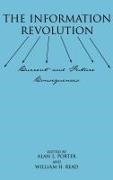Read more
List of contents
Foreword
PART I: IMPLICATIONS FOR MODERN MANAGEMENTMeasuring Information Age Business, Gary S. Tjaden
Knowledge Capital: Management Principles for Every Organization's Five Most Valuable Assets, William H. Read
Mass Customization in the Age of Information: The Case for Open Engineering Systems, Timothy W. Simpson, Uwe Lautenschlager, and Farrokh Mistree
PART II: IMPLICATIONS FOR THE WORKPLACE
Workplace Changes: Psychological Perspective, C. Michael York
Office Productivity: The Impact of Staffing, Intellectual Specialization, and Technology, Peter G. Sassone
The Impact of Groupware: Work Process Automation and Organiztional Learning, William M. Riggs, W. Hagood Bellinger, and David B. Krieger
PART III: IMPLICATIONS FOR ACADEMEUniversities and Information Technologies for Instructional Programs: Issues and Potential Impacts, Gary W. Poehlein
Revolutionary Change in the Electronic Publication of Science, Scott Cunningham
PART IV: IMPLICATIONS FOR POLITICAL AFFAIRSCitzenship on the Net: The Case of Environmentalism, Ann Bostrom and Gordon Kingsley
The Impact of Advanced Information and Communication Technologies on International Actors and the International System, Daniel S. Papp
Information Warfare: a Consequence of the Information Revolution, Myron L. Cramer
PART V: IMPLICATIONS FOR "INFORMATION SOCIETIES"The Impact of Information Technology on the Relationship Between the Public and the Private Realms, Micha Bandini
Myths of Information: The Cultural Impact of New Information Technologies, Anne Balsamo
Less Labor, Longer Lives, Time to Share, Alan L. Porter and Ann Bostrom
Technology, Jobs and Society: The New Challenge of Change, Robert M. White and Richard H. White
PART VI: PREDICTIONSForecasts for the future Members of the Georgia Institute of Technology Faculty Program on the Information Revolution: Current and Future Consequences
Author Index
Subject Index

